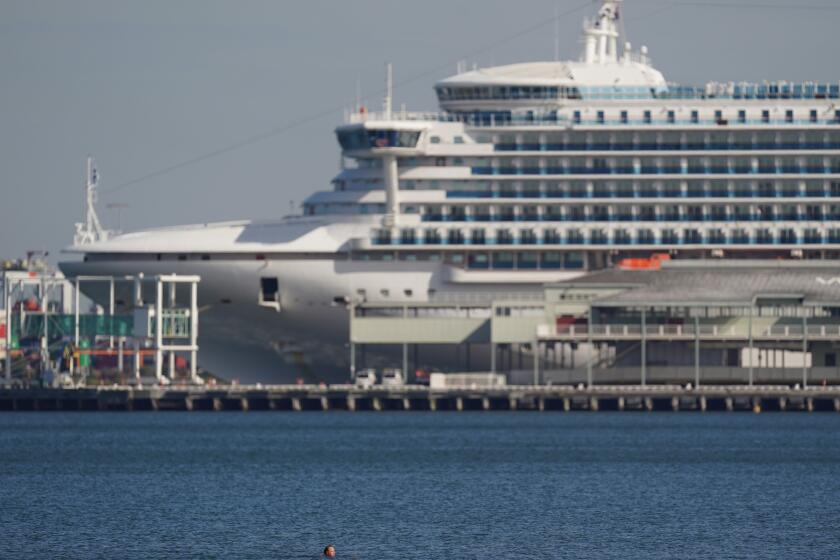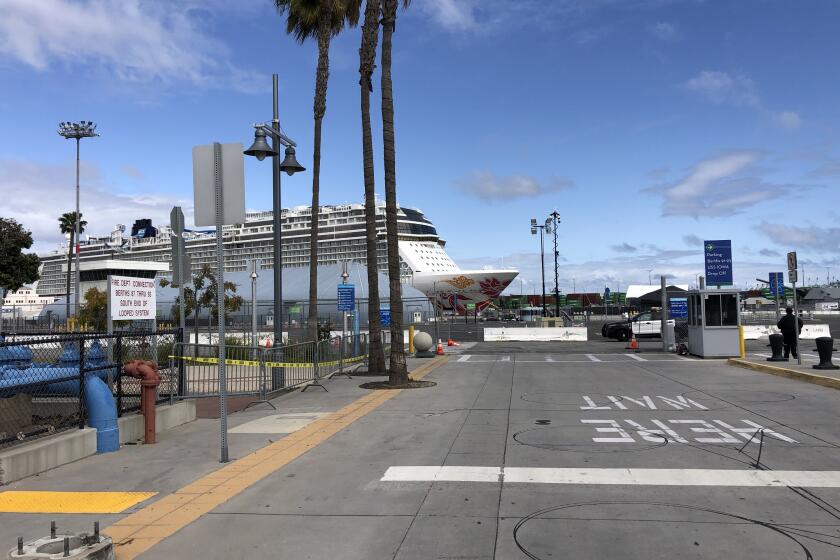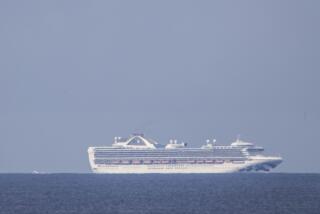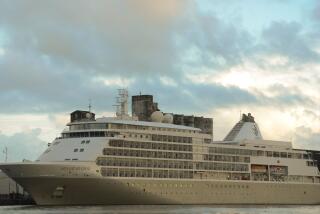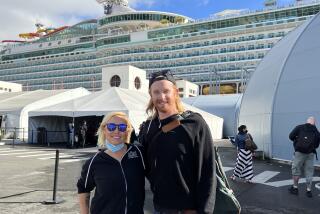Not all cruise ships had coronavirus outbreaks. It came down to a ‘stroke of luck’
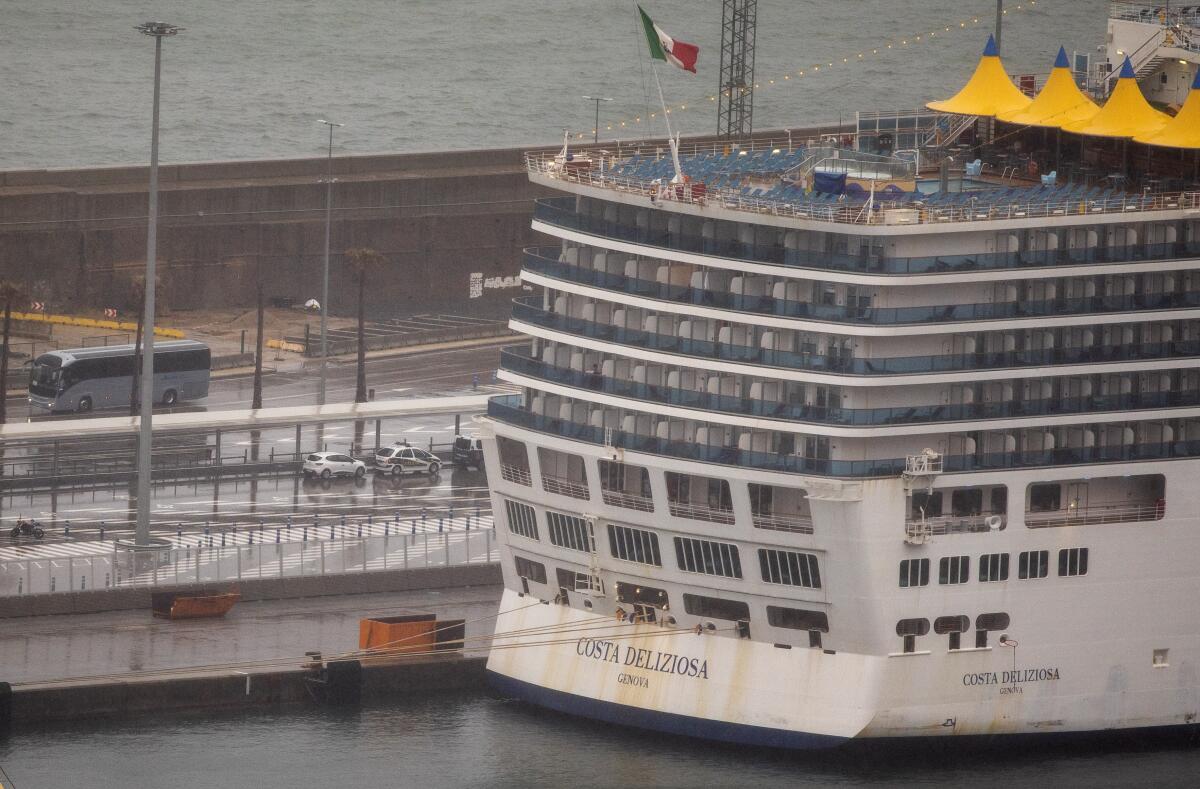
- Share via
BARCELONA, Spain — For Spanish traveler Carlos Payá, being on an around-the-globe luxury cruise while the rest of the world scurried into their homes for fear of the coronavirus was beyond surreal. It was “a stroke of good luck.”
Now, his trip inside the virus-free bubble aboard the Costa Deliziosa cruise ship on its 15-week odyssey has come to an end. The boat steamed Monday into Barcelona, Spain, its first port-of-call after 35 days of continuous sailing with no human contact with the outside world.
The Costa Deliziosa is one of the last three cruise ships believed to have still been out at sea until Monday, when all are expected to dock. Another of the three, the Pacific Princess, is reportedly due to dock in Los Angeles.
Unlike other cruise ships that suffered outbreaks and and were often put in quarantine to protect port cities, the Deliziosa has found no cases of COVID-19, according to its owner, Italian cruise company Costa Crociere. So the boat’s 1,831 passengers have been free to use the ship’s facilities and entertainments.
“It was not surreal. It was incredible,” Payá told the Associated Press by text messages on Saturday evening. “¨We have family in our home countries. The news that was arriving from home was causing us all a lot of worry and grief. For us, it was a stroke of good luck to be where we were.”
The Pacific Princess left on Jan. 5 for a 111-day world cruise that was cut short in mid-March. It’s currently making its way to L.A.
The 58-year-old Payá, a sportswriter traveling with his wife, said when news started to reach the boat of the rapid spread of the coronavirus back in Spain, their first desire was to get home to their two grown children in their hometown of Valencia.
But with ports denying the boat entry, they have had to temper their concern with the amenities on board.
Payá said that the ship, which set sail from Venice in early January, stopped making ports of call after leaving western Australia last month. Overall, he praised the ship’s captain and crew for their care.
He said the passengers’ last chance to touch land was in Perth, where they docked after “70 wonderful days” of crossing the Atlantic and Pacific oceans. That was when the U.N. World Health Organization alerted that COVID-19 had become a pandemic, in March. From that point on, the ship made only technical and refueling stops before the journey back toward the Mediterranean, which took it through the Suez Canal.
“Of course, for those of us who have children in Spain, we would have preferred to return,” Payá said. “Other passengers, on the other hand, given their old age, wanted to stay on board knowing that the boat was safe and secure.”
A Costa Crociere spokesman said a passenger left the ship earlier in the week in Marsala, Sicily, for health issues and had a COVID-19 test, which came back negative. Costa said the passengers were confined to their cabins only for the period until the ship heard back that the ill guest who got off in Sicily had tested negative. The company didn’t say how long that period lasted.
Many mothballed ships have to maintain crews. They’re looking for docks in California
The Deliziosa, a nearly 1,000-foot vessel, began to disembark 168 Spanish passengers Monday morning at Barcelona’s port. The Deliziosa is then scheduled to head to its final destination, Genoa, Italy, where it is expected to let off the remaining passengers, Italians and those of other nationalities, on Wednesday.
The Deliziosa was originally due to return to Venice on April 26.
French authorities had rebuffed a request by Costa Crociere for permission to disembark several hundred passengers from France and neighboring countries at Marseilles.
Passenger Jean-Pierre Escarras, from Marseilles, shot a video of their cabin that their daughters shared on social networks, in which he says: “This is our place of confinement. We are lucky to have a window.”
The couple said after a stop in Sydney, the ship’s activities were “reduced or sometimes canceled. We haven’t been able to get out on land since March 14 – that’s 34 days.”
Passengers said ports in Oman, along the Suez Canal, as well as in the Seychelles and Indian Ocean ports, refused to let the ship dock.
The company said that, because the ship is Italian-flagged, it followed Italian precautionary measures in the pandemic, including social distancing between guests, limiting the number of people who could enter food areas at any one time, and transmitting entertainment to cabin TV sets.
A Frenchwoman whose in-laws are aboard the Deliziosa garnered about 100 signatures on an online petition to urge the French government to intervene to get them home.
The regional administration for Bouches-du-Rhone in southern France cited a nationwide ban on allowing foreign cruise ships to dock, implemented as part of France’s virus confinement measures. Italy has also barred foreign cruise ships as it battles the virus outbreak.
The French administration granted exemptions to six other cruise ships in recent weeks to allow French passengers to get off, but refused for the Deliziosa, saying that the previous cruise ship stops overstretched local police and health authorities already mobilized to fight France’s severe virus crisis.
Family members fear for Los Angeles retirees trapped aboard the cruise ship Zaandam, which is sailing to Florida, where authorities are skeptical of welcoming ill passengers.
Last month, two other Costa cruise ships pulled into Italian ports, including one that earlier had passengers who tested positive for COVID-19 before being disembarked in France.
It is unclear whether the passengers who were due to finally step on land after weeks of sailing aboard the Deliziosa would be quarantined.
What is clear is that Payá and the other passengers are returning to a new reality of home confinement, face masks and worry.
“The return home will mean a radical change, a brutal one,” Payá said on Sunday after packing his bags before spending his last night on the Deliziosa. “Fear is what made many passengers want to stay on board. But it is something that we must face, just as our families, friends and neighbors already have.”
More to Read
Sign up for Essential California
The most important California stories and recommendations in your inbox every morning.
You may occasionally receive promotional content from the Los Angeles Times.
